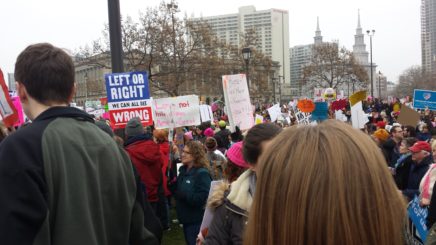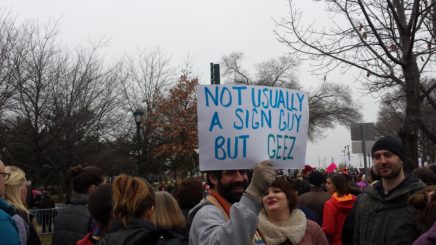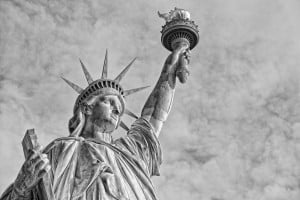
It is January 21st, 2017, the day after the election of Donald J. Trump as our 45th president; it is the day of the Women’s March on Washington. I wanted to go, and was all set to get up before dawn to make my way to the capital, when I heard there would also be a March in Philadelphia. Call me lazy; call me not as dedicated to the cause as I should be, but to be able to reach my destination within an hour and be home before midnight seemed a task equal to my commitment.
What was the draw? What made it so important for a Christian never-before protester to join thousands of others in what seemed like an endless sea of humanity? It was simple: I needed to do something.
What made it so important for a Christian never-before protester to join thousands of others in what seemed like an endless sea of humanity? It was simple: I needed to do something.
On the night of the election I watched in disbelief as the map of the 50 states glowed red, going to bed uncertain about the America I thought I knew. It was a shock to the system, yet I tried to be open-minded—asking myself what I missed about the president-elect that others had seen? And yet as each day passed I became more convinced that some kind of magical power had been unleashed across our nation, a magical power that brought blindness to what should have been blatant.
When the election statistics began to unfold, the real truth was too much for me to take in. If the data was correct, 81% of evangelicals voted for Mr. Trump. How could this be? His crassness was overlooked? His immorality was disregarded? His lack of public service was unnoticed?

These very truths made me ask the question: who was I sitting next to in the pew on Sunday morning? These were my people, yet they apparently did not value what I value. I heard a woman on the radio, who described herself as missionary, speak of Trump as the person who “would return our country to its Christian roots.” I had no further explanation than to believe that this unseen magical power was for evil and not for good.
So, this morning I got up and took the train to Center City Philadelphia. The packed cars were full of women and men who were euphoric with the idea that their voices still mattered, their bodies were too many to count, and their presence would make a thoughtful statement to the newly-formed government. I sat on the train, not knowing what my experience would be, but just glad I could be a part—one more person who was saying by her presence that something had gone wrong.
Pretty soon I was in a great crowd surrounded by signs and placards, some humorous, some serious, all with a message. I did my best to read each one, to see what the priority of the marchers was. Many focused on women’s reproductive rights, many drew attention to the objectification of women; while others were thoughtful quotes that called both women and men to action. As I walked amidst the masses, I tried to think what my sign would say.
Why was I there? What was I crying out against? If I could put my heart cry into words, what would it say? Sure, I wanted what many around me wanted, but none of their signs said what I was really thinking.
Why was I there? What was I crying out against? If I could put my heart cry into words, what would it say?
The reality was, I wanted something back that I felt we had lost in the last two months.
My sign would have said, “Christians for Sanity.”
Sue Gilmore is an author, activist, business woman and church worker. Her original plan of a career in full-time Christian work was sidelined when she realized that her sexual orientation would not allow her to pursue her lifelong goals. Pursuing instead a business career in Real Estate, she found that this path suited her God-given talents and she is now the Vice President and Regional Manager for one of the largest Title Insurance companies in the nation. God has always been the central focus of her life, even if she was not allowed by the Church to serve Him in a full-time capacity. Sue is the author of The Peace Seeker, which attempts to bring awareness to the public of the prejudice found within the Christian church surrounding the subject of homosexuality.



2 Responses
I too stand against anything Trump is doing which does not reflect what God values especially the refugee executive actions. In your article though, you insinuate that a vote for Trump was evil. People vote their conscience. Neither candidate reflected anywhere close to Christian values. They both represent the culture of death in various ways. The Church as a body needs to respond to whoever is in office with praise or condemnation depending on what is done. I voted for a 3rd party candidate since the democrats crowned Hillary without much of a fight. My vote for Bernie was useless. More importantly, I pray and act for what I can do in a positive way to influence young people to know Jesus in the poor so that when they grow up they will be better informed on what it means to reflect the crucified Christ in their daily lives.
Thanks for your reflection. I live out of the country, so I was not able to march. I’m so glad there are Christian voices like yours speaking up. I just checked out your website and blog. Is there a way to sign up? I hope you keep writing about your experiences. I’m intrigued by your title–Peace Seeker. I’m struggling with being accepting of those who do not see the racism, bigotry and misogyny of this administration. Everyone has a right to their perspective, but my heart aches for the pain it is causing and will further cause so many people. It seems you have been able to master that oh so difficult thing of loving the sinner and hating the sin. 🙂 Your insight would be appreciated.